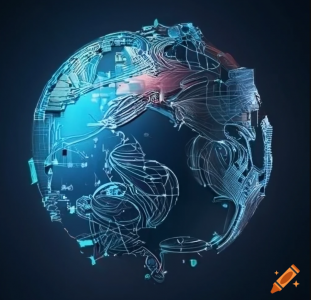Mind-blowing authenticity: AI and climate crisis
It is that time of the year when the words or expressions most prominent during the past year are generally revealed. Publishers of the world’s leading dictionaries elect their “word of the year” based on searches performed and polls open to the public. Consultancies also conduct research and rely on the help of experts to elect these terms. Let’s go to them.
By popular vote, the publishing house responsible for the prestigious Oxford English Dictionary announced that the word of the year in 2023 was “rizz”. Young people widely use the expression in the digital environment, and it can be freely translated as “flirting well” or, as the dictionary defined it: “style, charm or attractiveness, or the ability to attract a romantic or sexual partner.” The term comes in an abbreviated form of the word “charisma.”
Meanwhile, the traditional Cambridge Dictionary has chosen as the word of the year “hallucinate.” But the choice was not given by the original definition of the word, which is when a hallucination occurs, that is, “to seem to see, hear, feel, or smell something that does not exist, usually because of a health condition or because you have taken a drug.” The verb expanded its meaning with the advance of AI and began to incorporate what happens “when an AI tool hallucinates, producing false information.” The editors stated, “The fact that AIs can ‘hallucinate’ reminds us that humans still need to bring their critical thinking skills to these tools. Human expertise is arguably more important than ever to create the authoritative and up-to-date information that LLMs can be trained on.”
The North American Merriam-Webster examined the most searched terms to elect “authentic” as the word of 2023. Searches for the term significantly increased during the year, driven by topics related to AI, celebrities, identity, and social media. “We saw in 2023 a kind of identity crisis and realized that when we question authenticity, we value it even more,” said Peter Sokolowski, one of the representatives of the research.
The Collins Dictionary endorsed the two famous letters “AI” as the word of the year. The English publication defines artificial intelligence as a “model of human mental functions carried out by computer programs.” It is considered the next great technological revolution because of its rapid development, which is why it was so often discussed last year.
In Brazil, one of the year’s expressions was “climate change,” cited by 37% of respondents mapped by the CAUSE consultancy in partnership with the IDEIA Research Institute. The winning term was the most remembered among the 1,557 respondents of the study, among a list of seven finalist words previously defined by experts. The words “resilience” (14%) and “conflict” (12%) occupied the second and third positions of the ranking, followed by “artificial intelligence” (10%).
There is nothing new about the fact that artificial intelligence or its related expressions have become widespread in the media and popular consciousness due to the numerous advances and extensive discussions on the subject in 2023. This was the year of the worldwide rise and popularization of generative AI as the next technological revolution that promises to change our lives. As for this statement, only “time will tell.”
I hope that in this new year, we advance deeply the debates around regulatory aspects of generative AI. Only its ethical and responsible use will ensure the benefits expected by humanity, among which is the support for fundamental causes for the conservation of the planet for the present and future generations.
I agree with the 37% of Brazilians who responded to the CAUSE survey indicating that “climate change” was the most crucial term (and theme) of 2023, and I understand that it will also be in 2024.
The articles presented herein do not necessarily reflect Aberje’s opinion; their content is the author’s sole responsibility.
MARCOS SANTOS
Marcos Santos is Marketing and Demand-Generation Director at Unisys for Latin America, responsible for planning and executing the region’s brand awareness and demand generation initiatives. Before joining Unisys in 2012, Santos held senior roles in Public Relations agencies. Graduated in Journalism from the Methodist University of Sao Paulo, Santos holds an MBA in Corporate Communication Management from Aberje, a graduate degree in ROI Analysis in Marketing and Communication Programs from USP, and was part of the MicroMaster Program in Digital Leadership from the University of Boston.
COMENTÁRIOS:
Destaques
- Sports as an instrument of Change
- Aberje Launches Newsletter with Economic Panorama
- Charting a Path to Responsible Communication: WPRF 2023 Wraps Up in Chennai, India
- Global Alliance AGM elects new Board 2023
- Aberje discloses its positions on the Fake News Bill (PL 2630/2020)
ARTIGOS E COLUNAS
Marcos Santos Maratona da vidaMônica Brissac Thought Leadership: marca pessoal x reputação corporativaLetícia Tavares Liderança comunicadora: um tema sempre atualHamilton dos Santos Comunicação é estratégica na economia contemporâneaCarlos Parente Um salto ornamental para mergulhar no pires





























